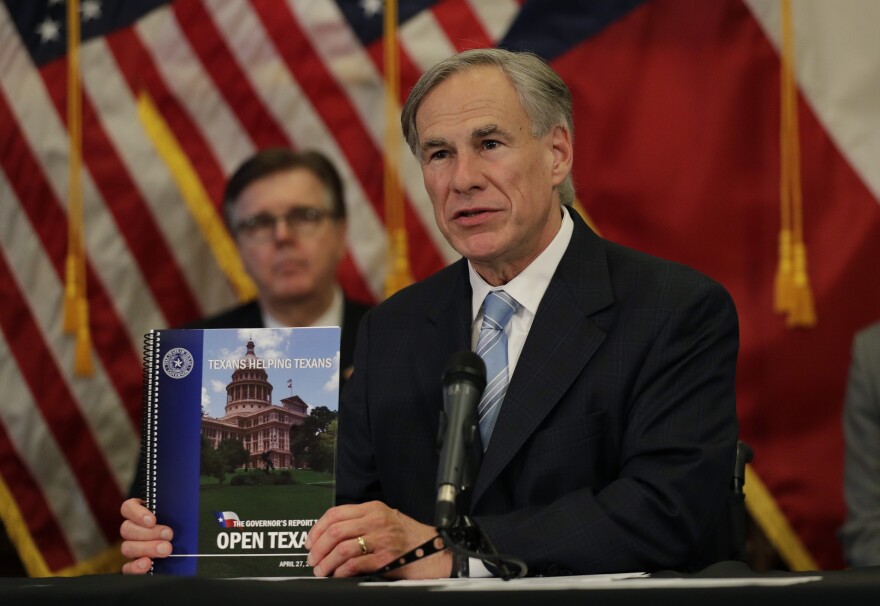Texas is joining other states in letting some businesses shut by COVID-19 reopen to the public – at least partly.
Gov. Greg Abbott announced Monday his previous stay-at-home order has done its job and will expire on schedule this Thursday. Abbott also laid out a path towards reopening some non-essential businesses.
The first part of Abbott’s reopening plan starts Friday, with all retail stores, restaurants, movie theaters and malls — but it’s only a partial reopening.
“I am limiting occupancy to no more than 25%,” Abbott said at a press conference Monday.
Libraries and museums are also included in the first phase, aside from their hands-on exhibits. Other sectors will have to stay closed for at least the next few weeks.
“Now there are some businesses that I want to open, that Texans want opened, that the doctors advised were simply not safe enough to open at this particular time,” Abbott said. “They include barbershops and hair salons, bars and gyms.”
Aside from detailing what can literally reopen on Friday, Abbott’s office also released a report with protocols for business — things like screening workers for COVID-19 symptoms and keeping sick employees from returning — but it’s not clear if these precautionary measures are mandatory.
Political Leaders' Take
Abbott said the announcement Monday was just “phase one.” That approach sits well with state Rep. Chris Turner (D-Grand Prairie), Chairman of the Texas House Democratic Caucus.
“I appreciate the incremental nature of what the governor laid out,” Turner said.
Dallas Mayor Eric Johnson said since state law allows Abbott to lead this process all Texans, including Dallasites, have to come together to make sure it works.
“The governor has made a decision, and under Texas law, he has the final say in these matters, so now it is incumbent upon all Texans to ensure that this plan is successful,” Johnson said in a statement.
Dallas County Judge Clay Jenkins said in a press conference on Tuesday afternoon that it's up to residents to take the necessary precautions when visiting movie theaters, restaurants and other businesses.
“It's up to all of you — both business owners and individuals — to make really good personal responsibility choices," he said. " The governor's orders have changed yesterday but the underlying science has not."
Jenkins said there are no plans to enforce fines or health inspections of business that don't follow Abbott's guidelines of social distancing and temperature checks.
How Many Tests Does Texas Need?
While Rep. Turner said he was glad the governor didn’t go full bore in his initial plan, he’s still concerned about the health of workers, and how the state will ramp up testing.
“We need a detailed plan to show how we’re going to increase testing capacity,” Turner said. “I didn’t hear it.”
Testing is the lynchpin of any plan to fight an epidemic because it allows health officials to know where the disease is spreading. A recent study from Harvard suggests to open safely, Texas would need to test about 45,000 people per day. The state is far behind that, and Abbott said his goal is 25,000 tests daily.
“Getting up to 25,000 tests is something that should occur early on in the May timetable that we’re looking at, as we work our way through phase one,” Abbott said. “The additional tests will be coming in part from the massive increase in the amount of tests being provided by the private sector.”
Abbott hopes he can announce further openings, phase two, by May 18, but that rests on whether the virus flares up in the first two weeks of May.
Rebecca Fischer, infectious disease epidemiologist at Texas A & M Univ., said two weeks is probably not enough time to gauge that. According to her, the first two weeks of May will reflect what’s happening right now, under current guidelines. COVID-19 symptoms can take two weeks to show up. Fischer said a month would give the state a clearer idea of how things were going.
“That would allow individuals who are exposed to develop symptoms, report for testing and for those testing results to be completed by the laboratory and reported to a local health department, which in turn would put them as a number in the data that the governor is referencing,” she said.
Boosting The Economy
It’s an open question whether these steps to reopen the economy will actually boost the economy.
Emily Williams Knight, CEO of the Texas Restaurant Association, said she feels “very good” about Abbott’s plan and thinks it will work for restaurants. She said the plan will give these especially hard-hit businesses the time they need to come back, if they’re able to do so.
“I think in probably another week we’ll be able to give you a good estimate of who we think will definitely open over the next couple of weeks and who may be closed for good,” she said.
Abbott stressed businesses are not required to reopen — the order simply allows it. Williams Knight cautioned restaurant owners, if you’re not ready to reopen, don’t.
KERA News is made possible through the generosity of our members. If you find this reporting valuable, consider making a tax-deductible gift today. Thank you.





